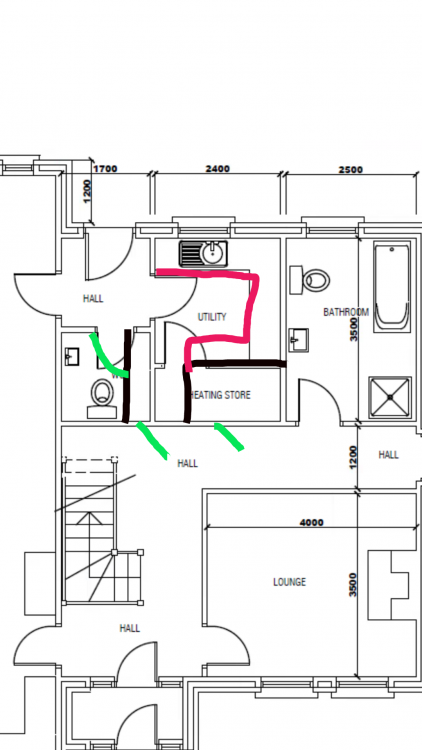Leaderboard
Popular Content
Showing content with the highest reputation on 09/22/17 in all areas
-
My parents in law have a number of wealthy friends - sold their businesses for £10-30 million type of well-off (after years of raking in hundreds of thousands of quid per annum from these businesses). All are retired with huge houses, expensive cars every couple of years, large holiday houses in France, trips all over the world. Yet to a person, all they seem to care about is foreigners, benefits cheats, regulations inconveniencing them ("health and safety gone mad!") and the amount of tax the government "steals" from them. I have a lot of difficulty sitting in the same room hearing them talk about how hard they worked to get where they are, as if every poor person just needed to a work a bit harder to get everything they've had. Oh, and it seems they all read the Daily Wail! I think the problem is that selfishness makes you unhappy. All the research shows that true happiness comes from giving, not getting. If these people spent a bit less time (and money) trying to fill the voids in their own lives with "stuff", and a bit more time trying to make the lives of others better, I'm sure they'd be happier. Not really a conversation you can have with them of course!8 points
-
I've been subjected to those management exercise / team building things. Drives me nuts and tbh I'm almost there on a good day. First one we all had a psych test for want of a better word. Me and my governor got 100% identical scores (with no collusion) and profiled the same which pissed him off no end! Second involved role play and I was given a difficult customer / no win situation. I simply stated the assessor needed to stop there and then as in the real world I'd have dragged them across the counter and settled it that way. Nobody argued. Third team building day and we were split into teams. You completed a task then the next team followed you. On some huge country estate. I hung back after completing my teams task and hid a load of the scaffold boards, barrels etc. There was no way the next team was crossing the imaginary lake without the sharks getting them. The instructors were going ballistic. Kobayashi Maru!3 points
-
I think there is also the added issue that some of us self-building have significantly higher expectations than some contractors who build stuff every day. There are some really good tradespeople around, but my experience is that they are a bit thin on the ground. There are many tales on this forum, and it's predecessor, that bear this out. One consequence I found was that I ended up teaching myself to do things, rather than contracting it out. Even if it takes me four or five times longer to do, at least it will get done to the very best of my ability. Finally, a comment about the observations that it's the small stuff that gets to you, in terms of decision making stress. Many years ago I was subjected to a "management transformation programme", one week a month away on the course for 6 months, that was intended to produce the needed new generation of senior managers for the brave new world of running defence research as an internally-trading "business". Generally it was a load of BS, but there was one session that was brilliant, so much so that I can remember practically all of it. It was run by a psychologist, and as well as the usual stuff about personality types, building teams etc, there was an exercise to demonstrate how the importance of a decision was often inversely proportional to the amount of effort put in to the decision making process. This is the sort of thing we've probably all seen; spending more time researching what new widget to buy than you spend on choosing what house to buy. In this case we were divided into two sets, and sent off into separate rooms, where there was a sealed envelope with a question in it. These rooms had video cameras set up, so that we could watch how we behaved afterwards. In one room, the question in the envelope was "How many nuclear warheads should the UK have in order to form an effective deterrent?". In the other room, the question was "What is the ideal size for a garden shed?". There was a time limit, around 10 or 15 minutes I think, to come up with an answer. The interesting point was that the team asked to decide on the number of nuclear warheads came up with an answer very quickly, after less than 5 minutes of debate. The team asked to decide on the best size of garden shed didn't reach a conclusion; they were still arguing about it when their time ran out................3 points
-
I'm exactly like this. It doesn't matter if you miss a stud once or twice with the nailer (so long as nobody is standing on the other side!) but once you reach the point where things are going to be on show, you have to be much more careful- I've found that I've slowed down quite a bit. Everyone else seems to think it's daft that I'm more apprehensive about fitting s piece of skirting board than I was about installing a joist, or pouring founds. On the general question of stress and timescale, I've found my enthusiasm waxing and waning throughout the project. I wish I could go back to the very start when I was spending hours on Sketchup trying out different layouts (none of which I used in the end- the final one only emerged after I'd started plasterboarding). If you could bottle than endless energy, and use a bit of it at the end of the build, wouldn't that be wonderful?3 points
-
Steamy, we're still at the spreadsheet stage. But there's a growing determination to get the job done one way or another. Looking round the Fylde, you can see a handful of housing projects which have (apparently) stalled. HERAS been up for a couple of years and no real progress evident. My problem is not unique. But we do live next door, I can do stuff anytime I like, I am retired with nowt else to do except think and be as creative as I can. I can plan. I can network. I can beg. I can steal. I can borrow. I can earn more money than I am at the moment. Where's the hardship in that? Why it would be as difficult as the average BH member working all day and coming back at night to get on with it Every day I see faces of local people walking past the site green with envy, some sneers, some smiles. How many hundreds of couples would give their back teeth to have my problems? I am very very lucky.3 points
-
Your down stairs toliet is 1700mm wide which for just a toliet and sink is massive. In order to get access to the utility room from the hall you could reduce this to 1000mm and then take 200mm from the heat store to give you a door. Put a door into the heating store ( what's going in here with a hotpress upstairs) from the hall and it will give you another wall for more units in the utility room. Will still give a floor area of 1200mm wide between the units so won't feel small. Green are the new doors, pink is the units and black is the walls.2 points
-
Systems and people show themselves for what they really truly are when things go wrong. When all's well or just OK, or there's no contest for resources (the most common stressor) we can make good progress. The trick for me (us) is learning how to react appropriately to many challenging events, often with little time separation between them. It's the lack of control that gets to me. Many of us here came from an environment where we were quite senior - if not in rank then in terms of control. We knew (know) our jobs very well indeed. In research terms, we are experts by experience. (Usually occurs at 50,000 and over hours on the job). We can handle exceptions, we have the contacts, we have the in-depth of knowledge attitudes and experience sufficient to handle most things. House building strips that 'expert status' away. So, the challenge is the thing. It's our reaction to challenge that really matters. And we all know how we individually do that. Just look back at how you've faced other challenges. Chances are you'll do the same or (importantly) nearly the same as you've done before. We've all had challenges, so we know how we've faced them. Sometimes well, others not. They are, therefore, a huge resource which we can mine. How can we adapt the way we faced previous challenges to this one? Cherish them.2 points
-
That probably describes me except I think I am a lot more positive. Nothing gives me more joy in life than helping people. You can't take it with you and we're all going to die eventually. Once you accept those things there's a lot less to worry about. I notice a lot of the guys on here seem to be retired and have a lot of time to help people out, I am sure they really enjoy it. The media has a lot to answer for, they seem to have taken the view that misery sells and scaring people gets clicks. Politics has also taken the same tack, scaring people into voting for you. I wish someone would come out with a positive upbeat view of the future. In fact I will. Despite what people say and the move to measure everything relative to what everyone else has.. People have never been richer, had a higher standard of living, lived longer or had more opportunities than they have today. Perhaps someone needs to point that out.2 points
-
Well, I am in a very fortunate position, I don't get stressed!!!!!. I am retired, I have all the funds to complete the build plus contingency, we don't have a firm completion date (temp rental just down the road on a month by month basis). I have a wonderful builder working for me. A word of warning, Stress causes illness, I know, after many years of a stressful life with more than my fair share of illness myself and even the death of a person very close to me I suddenly said " NO MORE", I am very lucky that I can do this, not everyone can. If something goes wrong, shit happens, so what! get over it. It's things like Ian's (recovering academic) misfortune with builders and bankers that make me feel even more lucky. "RANT" We went out for a meal with friends last night as we are about to move from Bristol to near our build site in Devon, the evening descended into a tirade of "you cant do this, you cant do that anymore, pay tax on this, pay tax on that, government don't know what their doing. It reminded me of the "grumpy old men" programme on TV. Both other couples were successful, had good health (in fact one couple had just collected their brand new convertible Mercedes Benz after returning from their boat on the Med. I confess I kept quiet but felt very annoyed. I dont suffer negative people very well. I consider myself very lucky. "RANT OVER"2 points
-
Hi Everyone, Reading some problems of other forum members recently made me think about this. My build is approaching the end, I am hoping to be into my house house in early December. I have found the last two months by far the most stressful part of the build. Early on, there was a lot of heavy building work and decisions on that were made before we started, I didn't have to get involved. Recently though the amount of input required by me has ramped up such as deciding where every socket and light fitting in the house goes and sourcing items I have specified such as fires where the builder can't really just go and buy them. We have also made some last minute changes. The combination of working, and it doesn't help that I work in London but am building in Edinburgh, trying to sell our own house and also having to make decisions in conjunction with my wife on paint colours tiles, etc when up until now I could make most decisions alone has been very hard work and stressful. I am sure that everyone's build has different kinds of stress, costs being more than expected, builders who let you down, planning issues etc. So maybe it would be good to warn people what to expect and ways to make it less stressful. I thought I had put an enormous amount of work in so that it would be plain sailing once we actually started. That didn't allow for the fact that what works on paper may not work when they come to build it and that my wife only realised she didn't like some things once she saw them in real life as she struggles to understand plans. Anyway I am sure it will all be worth it in the end and my stresses are much less than other people's but maybe it's worth just telling people what to expect before they start and helping to avoid some pitfalls.1 point
-
I'm always keeping an eye on induction hobs as this is what I eventually plan to have in our new house. A really interesting (to me!) article is in the latest issue of Which? They compared a best buy Samsung NZ63J977OEK at £799 with a New World IHF60T at £254. The Samsung got a score of 80% whilst the New World got 79%. Barely a gnat's whisker between the two for performance (Which? comment that the Samsung is slightly quicker) but a whopping price differential. The cheapest current supplier for the New World is Argos.1 point
-
1 point
-
Take great care here, or you could create rods for your backs. It is shorter to take the time you need now rather than spend 2 months doing gas monitoring later. Soil Conditions At this point step back, take a breath, and over the w/e read what the report actually says - eg what is a "must" and what is an "ought to", a "could", and what is a "perhaps". Remember you do not *have* to submit this particular report. They are your consultant and you can have a conversation with them about more appropriate wording (or omission of some parts), given any further information you find out. Watch out for the box-tick reflex here. The Council's easiest response will be "he should do what his own consultant told him to do", which will translate to a Planning Condition. If you do not want to do a Phase 2 + monitoring then you need to be able to justify on balance not doing one. I think you need some more data eg are you actually in the Landfill buffer, or is it just the bottom of your garden, have tests been done before, have other developments (esp. single houses) between you and the Landfill been allowed with only a Phase 1, and so on. You should be able to access public data on eg monitoring points on public land or the landfill itself. You also need to watch what Council policy was back then vs what it is now. No good arguing on the basis of a policy that has been superseded. I think you are going to need some sort of Ground Conditions report a a separate item. Take care with what it says. Did not @JSHarris note that you could do your own Phase 1 report somewhere? Suggest you re-read Jeremy's Food Risk Assessment linked earlier in the thread. It is a good example of how to use official data to argue for your own justified conclusion. Even the last para is designed to use the existence of official data, as well as its content, to create the path of least resistance for the Council to be to follow the Applicant's desire. There is no pussyfooting "in the opinion of the Applicant" here. Heritage Statement Though this is flagged, the need has also been undermined by the Pre-App, so you will be quoting that for a start. I would work out why it is supposed to be a Heritage area, what the relevant Heritage Assets are, and show how that is not affacted by your plot (hopefully you can show it doesn't, otherwise you may be employing Archie the Ologist to watch your builders dig holes). You can do things like choose a method of construction which involves less digging. I would make the Heritage Statement a carefully worded section of your D&A explaining whatever it is you find out, and how that means it is appropriate to do 'X'. Ferdinand1 point
-
Do you want this here or on the other thread, as it relates to the Pre-App Advice you posted there? FYI My comments are over there.1 point
-
I've stopped watching the nightmare tenant programs We have several rentals that we have rented over the past 15 years or so and never had a problem with any of our tenants there are many WORKING people out there that will rent from you, pay on time and look after your property1 point
-
well, along with the build, renting out our current house in Bristol ( i refuse to watch tv about nightmare tenants) moving into rental in Devon, my wife is also changing jobs and being mucked about by lack of co-ordnation by current and future employers. she is also lamenting missing her friends and colleagues here in Bristol so i have to be overly optomistic (which i am anyway) and keep saying "what could possibly go wrong" (with my fingers crossed behind my back). My stress is painting our current house ready for tenants , I LOATH painting.1 point
-
Ave! Oh Sage of the South: all Hail ! One Land One King! You did speak, I did ask, From the cloud, the Sage of Structures did answer And, lo! All was well ! Just off to polish me threaded bar. I have a job for it.1 point
-
Following on from this there is another benefit - I've been on some anti-anxiety drugs for about 4-5mths now. The net benefit apart from some more mental clarity is that i'm much more comfortable walking about up on the top of the scaffold :-)1 point
-
The man who has one house to live in and one house part built is better off than the man with one house to live in. Panic yee not!1 point
-
Must confess, my (our) hearts are in our mouths at the minute. And the real irony is that for a few years, I gave lectures to 200 students at a time on Resilience in the Professional Context ! Ha! Good deal of careful thinking and discussion due this weekend.........1 point
-
I have used Ever Build Lumberjack 650 14kg Flexible Wood Flooring Adhesive at £59 per tub. Lay 3 or four widths of floor dry and do any required cuts. Mark with a pencil the edge of the last boards. Take up the planks and stack them behind.you. The tub contains 2 bags of adhesive. Just cut the corner of the bag and carefully squeeze out and then spread over the area with a notched trowel. Do not go over the line you have marked. Spread with great care to make any mess. You will get used to squeezing out just the right amount which will make spreading easier. Our chippie does this without gloves and does not have any adhesive on his hands or on the face of the flooring by the end of the day. Do not pour the adhesive into the tub as it will set around it. The bags prevent any waste. When I have used tubs in the past, I end up with over a kilo of adhesive setting round the edge and in the bottom, as well as stringy bits and lumps which make spreading more tricky.1 point
-
It's a very important point and one we've experienced now we're in the final furlong. We were really struggling to make head way on paint. We popped into Farrow and Ball on Great Western Road purely by chance and walked out £195 lighter having paid for a 'ColourConsultation',something you'd never catch me doing. What sold it? When he said 'It might not be for everyone but could save your marriage'. I looked at my other half and we both laughed - and we signed up. It was money well spent. It's much much easier to agree when you have someone knowledgeable who can address the technical side of the debate confidently - like 'no, that grey is the wrong base tone for that blue' - we don't argue, just accept and carry on. We have the full house planned now after a 1hr 30mins session. We're not sure about two but the good thing is,we got there quicker and never fell out. Tiles were tricky as we did that ourselves - round in many circles!1 point
-
I tend to like to buy a basic version of a better known brand as I assume that the quality and reliability will be better. Also they do tend to have better after sales service so that if something does go wrong it is easier to get them fixed and get parts. However, this is where you may in fact just be paying for brand and where the power of the internet might help. As people buy products and review them on line you can get a much better feel for the real life user experience. As @Ferdinand says, Which won't have used these items for a long period of time and that is where you can really tell how good something is. If over time you can find a product where real life buyers are happy with it and it is cheaper than it is a win. Of course people like to go onto the internet to complain about things which means that you don't exactly get a representative view of products. Also if you go onto Amazon you will find reviews written by the seller, bad reviews of products because they were delivered on the wrong day even though the product itself was fine and reviews stating that a product someone got yesterday is the best thing ever, when longer term owners say that they all break down. Anyway I would note that on AO.Com the New World has a few positive reviews although there are some similar priced products also well reviewed. I like to look at the worst reviews to see what issues they highlight. For example a well reviewed BEko induction hob appears to split the power between 2 rings if both used at the same time.1 point
-
A reluctant oven can contact JustEat to get you a pizza. Can't do that on a gas on.1 point
-
We didn't use an architect, but I did spend a great deal of time trying to learn enough about architecture and building regs to design our house myself. I passed this outline design (once we'd got planning permission) to a company that supplied the insulated foundation and airtight, insulated, frame, as a package, and they did all the detail structural design. I looked at it in terms of my time being free, so the more I could do myself, the more I could save. Not the fastest option, but we did save a lot of money. In terms of building work, I just did the stuff I felt comfortable doing, and left the other stuff the sub-contractors that we hired in.1 point
-
OH and I started off looking at kit type houses - everything from DanWood to Huf. Huf was just to horrify ourselves with what we would never be able to afford! Eventually, though, we decided that none of them really offered what we wanted and by the time you had altered them enough to what you had in mind, you might as well go down the individual route. One of the particular things that put me off the kit houses was the insistence on the foundations being laid to an incredibly tight tolerance but giving very little in the way of help and guidance as to who to use (apart from one company). We bought a plot in north Dorset, near Sturminster Newton, with an old pre-fab bungalow on it that will be demolished and replaced with the new house. I found the plot by keeping a keen eye on Rightmove and property sites. Re. the design, I 'interviewed' several architect/architectural technicians firms as well as seeing a couple at self build shows. Some I really didn't like and so wouldn't use, some were way over the top on their fees but there was still a good selection of reasonably priced, personable individuals that we felt we could work with and who were relatively local to us. It's hard to be open minded and not be overwhelmed at the beginning, but don't be afraid to change your mind - it's your own money you will be spending!1 point
-
Hi welcome, we are in Cirencester. We brought and renovated 2 houses to try and get what we wanted. Now on our second new build ( if we get permission) look at older stuff usually better sized rooms than the new shite, and larger plots1 point
-
Our 1 1/2 storey house has the same, a large ridge beam with the deep rafters hung from it. There are some photos here of the frame: http://www.mayfly.eu/2013/10/part-eighteen-a-house-in-4-12-days/1 point
This leaderboard is set to London/GMT+01:00


.jpg.c21f3ac78c9b7efd90cbdcb312744dc5.thumb.jpg.7adcad4c0e384f5ecd7d56b0618df6e5.jpg)







